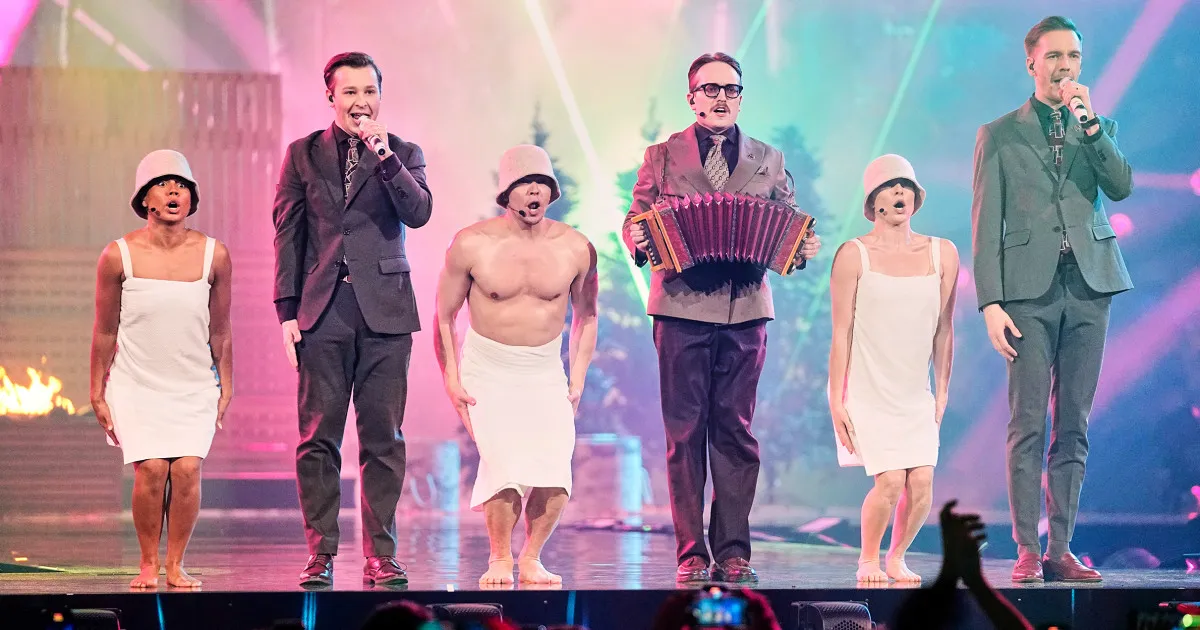
Fans from across the globe have flocked to Basel, Switzerland for the highly anticipated 69th Eurovision Song Contest. This iconic event draws supporters who are eager to cheer on their favorite performers representing their home countries. The contest has seen intense competition in the semifinals, leading to 26 acts vying for victory in the grand final. This year, Switzerland, as the host country, along with the Big Five—France, Germany, Italy, Spain, and the United Kingdom—automatically qualify for the final due to their significant financial contributions to the event.
As artists prepare for a spectacular showcase filled with glitter and extravagant performances, thousands of fans gather at Eurovision Village, a convention center transformed into a vibrant hub for enthusiasts. Fans passionately display their national pride, draping flags over their shoulders and painting their faces with national colors. The EuroClub becomes a lively scene where attendees dance late into the night, enjoying an endless stream of Eurovision hits.
The event is described by members of the UK’s Remember Monday group as a cultural phenomenon, akin to the Super Bowl in the United States. Holly-Anne Hull, a member of the group, remarked, “Everyone knows what it is, and everyone, whether they like it or not, is aware of who’s won it every year.”
The grand final will take place on Saturday, airing at 3 p.m. ET on Peacock for viewers in the U.S. The winner will be determined through a combination of votes from national juries of music professionals and viewers watching from home. Fans worldwide can participate in the voting process via the official Eurovision app or online.
Betting on Eurovision has become a lucrative venture, with sports betting firms providing insights on which songs are likely to excel in the grand final. This year, Sweden emerges as a favorite, boasting an impressive history with seven previous wins since the competition began in 1956. The Swedish group KAJ, consisting of a trio of Finnish performers, will present “Bara Bada Bastu,” a celebratory tribute to the Nordic sauna tradition. Notably, this track is already the most-streamed song from this year's contest on Spotify.
Austria also stands out as a top contender. Singer JJ, known for his extraordinary vocal abilities, captivates audiences with his song “Wasted Love.” Additionally, the Dutch entry, “C’est La Vie,” performed by singer Claude, features a blend of French and English lyrics, making it the third most-streamed song among this year's nominees.
The range of genres represented in this year’s Eurovision entries is striking, with some performances drawing attention for their unique lyrics and flamboyant staging. For instance, the Icelandic duo Væb entertains with their energetic song “Róa,” which features oversized silver outfits and jewel-encrusted sunglasses. Meanwhile, Finland’s Erika Vikman performs “Ich Komme,” showcasing a dramatic climax with her on a giant microphone, surrounded by sparks.
As in previous years, Israel’s participation has sparked protests due to the ongoing conflict in the Gaza Strip. This year’s contestant, Yuval Raphael, is a survivor of the Hamas-led attack on the Nova music festival on October 7, 2023. The European Broadcasting Union (EBU) restricts lyrics deemed political, having previously required Israel’s entry to amend lyrics referencing the attacks. Martin Green, the director of the Eurovision Song Contest, emphasized the EBU's commitment to maintaining the contest as a universal event that fosters connections through music.
Moreover, the entry from Malta caused controversy due to its lyrics in Miriana Conte’s song “Serving.” The original version of the song contained a Maltese word that sounded vulgar in English, prompting the EBU to request modifications. In a statement, the EBU clarified that broadcasters could alter unacceptable songs prior to the contest deadline.
Another controversy arose with Estonia's entry, “Espresso Macchiato,” by Tommy Cash, which faced complaints from the Italian consumer group Codacons over offensive stereotypes. The spokesperson for Eurovision has yet to comment on the situation regarding Estonia’s submission.
One of the most talked-about topics leading up to the final is the potential appearance of Céline Dion, who famously won the contest for Switzerland in 1988. Although Canadian by nationality, artists can represent countries other than their own. Dion expressed her desire to participate in a video message during the semifinals, stating she would “love nothing more” than to be at the event. Despite her ongoing health challenges due to stiff-person syndrome, Eurovision officials remain in close contact with her, prioritizing her well-being above all.